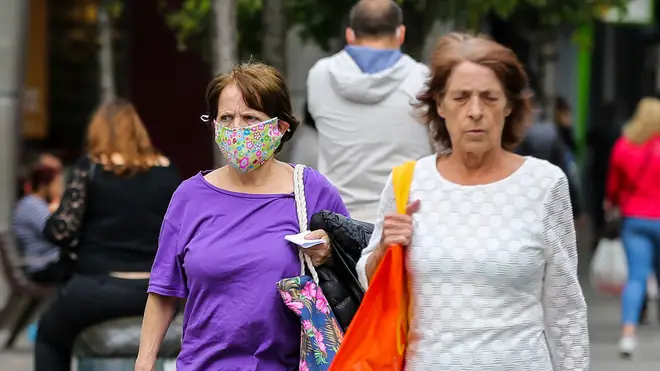
Nick Abbot 10pm - 1am
18 September 2020, 13:49 | Updated: 18 September 2020, 20:31

The UK's coronavirus R number has risen to between 1.1 and 1.4, an increase from 1.0 and 1.2 a week earlier, according to the government's Scientific Advisory Group for Emergencies.
SAGE confirmed on Friday that the reproduction number of Covid-19 transmission across the country remains above 1, meaning that Britain's epidemic is growing faster.
The R number stands for the rate of infection. It represents the average number of people one infected person passes a virus on to.
Keeping the rate "as low as we possibly can" is vital for beating coronavirus. If the R is above 1 then people will pass it on to more than one individual on average, meaning the spread of the virus is accelerating.
However, if it is below 1 it means that people are passing on the virus to fewer than one other person on average, meaning the rate of infection and therefore the number of people with the virus, will begin to decrease.
It comes after new coronavirus restrictions were announced for the North East on Thursday and for the North West, the Midlands and West Yorkshire on Friday.
Explained: Coronavirus: What is the R number and why does it matter so much?
Read more: Restrictions on care home visits to be imposed as part of winter plan

Theo Usherwood gives the latest on coronavirus restrictions
The measures in the North East came into effect at midnight yesterday, while the other three regions will be affected from Tuesday onwards.
In a statement, Health Secretary Matt Hancock explained that the number of people testing positive for Covid-19 had been rising "fast" and added that the government was "acting decisively" to protect local communities.
He said: "I know these restrictions will make every-day life harder for many, but I know that residents will work together and respect the rules so we can reduce rates of transmission.
"I urge local people to isolate and get a test if you have symptoms, follow the advice of NHS Test and Trace, and always remember ‘hands, face, space’. By sticking to these steps, we will get through this together."
Read more: 10 million people in lockdown in UK after further restrictions
Read more: Two million people in North East hit with new Covid restrictions

Boris Johnson says second wave of coronavirus ‘inevitable’ in the UK
In a further update, the statement said people shielding in the city of Leicester and north-east Blackburn would no longer need to do so from 5 October.
Other areas have also been removed from the coronavirus watchlist after a marked improvement in transmission.
These include Swindon, Breckland, Great Yarmouth, Norwich, Broadland, North Norfolk, South Norfolk, King's Lynn and West Norfolk.
Labour leader Sir Keir Starmer called on Prime Minister Boris Johnson to hold a Cobra meeting due to the rise of infections.
He said: “I am deeply concerned about the sharp rise in coronavirus cases and the difficulties people across the country are facing getting a test.

Matt Hancock has refused to rule out two-week lockdown
“There is mounting concern about whether we have got the virus sufficiently under control. This is the time for swift, decisive national action. We cannot afford to be too slow.
“That’s why I’m asking the Prime Minister to convene a COBRA meeting and to update the country on the measures the Government is taking to keep the virus under control, including to fix testing."
It comes after Mr Johnson warned earlier in the week that the country needed to flatten the "second hump" to protect Christmas.
The UK leader said tough action was necessary to stop the virus "in its tracks" and to avoid a second national lockdown.
He told The Sun: "I'm afraid infections do feed through to mortality and that is a fact we have to deal with.
"The crucial thing now is that I do not wish to go into some great lockdown again that stops business from functioning."
Listen & subscribe: Global Player | Apple Podcasts | Google Podcasts | Spotify